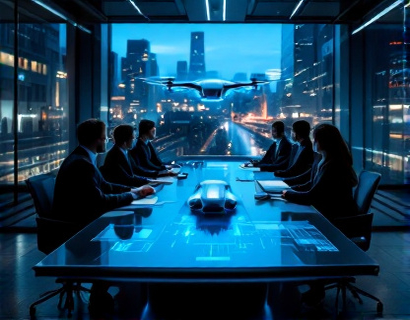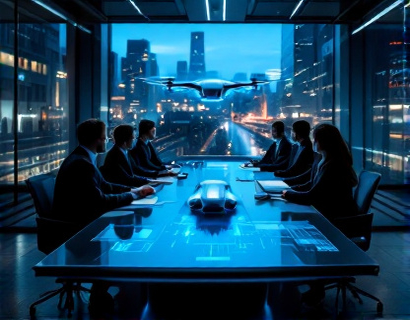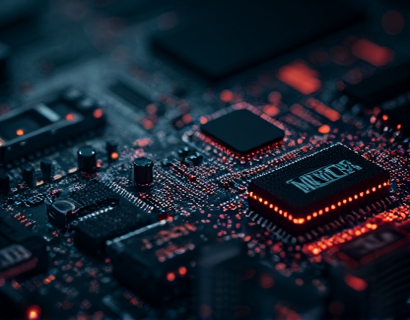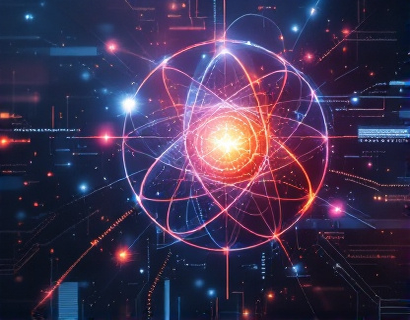AI-Powered Aeronautics: Transforming Businesses with Intelligent Agent Solutions
The aeronautics industry stands at the forefront of technological innovation, driven by the integration of artificial intelligence (AI) and intelligent agent solutions. These advanced technologies are revolutionizing the way businesses operate, offering unprecedented levels of efficiency, accuracy, and insight. This article delves into the transformative power of AI in aeronautics, exploring how intelligent agents streamline processes, boost efficiency, and provide tailored insights to address the unique challenges of the sector. Whether you are a professional or a business in the aeronautics industry, understanding these advancements is crucial for staying competitive and embracing the future.
Understanding AI in Aeronautics
AI, a subset of artificial intelligence, involves the development of systems that can perform tasks requiring human intelligence, such as learning, reasoning, and self-correction. In the context of aeronautics, AI is leveraged to create intelligent agents capable of automating complex tasks, analyzing vast amounts of data, and providing actionable insights. These agents are designed to adapt to new inputs and perform actions that traditionally required human intervention, but with greater speed and accuracy.
Streamlining Operations
One of the primary benefits of AI-powered intelligent agents in aeronautics is the streamlining of operations. From flight planning and maintenance scheduling to supply chain management, these agents can optimize processes across various facets of the industry. For instance, intelligent agents can analyze historical data and real-time conditions to generate optimal flight paths, reducing fuel consumption and travel time. This not only enhances operational efficiency but also contributes to environmental sustainability by lowering carbon emissions.
Enhancing Decision-Making
Decision-making in the aeronautics industry is complex and multifaceted, involving numerous stakeholders and variables. AI agents can process and analyze vast datasets to provide insights that inform strategic decisions. For example, predictive analytics can forecast demand for aircraft parts, enabling proactive inventory management and reducing downtime. Additionally, AI can simulate different scenarios to assess risks and outcomes, allowing decision-makers to choose the best course of action with confidence.
Intelligent Agents in Maintenance and Repair
Maintenance and repair are critical components of aeronautics, ensuring the safety and reliability of aircraft. Intelligent agents can significantly enhance these processes by implementing predictive maintenance strategies. By continuously monitoring aircraft systems and components, these agents can detect anomalies and predict potential failures before they occur. This proactive approach not only minimizes unexpected downtime but also optimizes maintenance schedules, reducing costs and extending the lifespan of aircraft.
Real-World Applications
A notable example of AI in maintenance is the use of machine learning algorithms to analyze sensor data from aircraft engines. These algorithms can identify patterns indicative of wear and tear or impending failures, allowing maintenance teams to address issues promptly. This level of precision and foresight is invaluable in an industry where safety is paramount. Furthermore, AI can automate routine inspection tasks, freeing up human technicians to focus on more complex and critical tasks.
Supply Chain Optimization
The aeronautics supply chain is intricate and global, involving numerous suppliers, manufacturers, and distributors. AI-powered intelligent agents can optimize this complex network by providing real-time visibility and predictive analytics. These agents can monitor supplier performance, forecast demand, and identify potential bottlenecks, ensuring a smooth and efficient flow of goods. By automating procurement processes and optimizing inventory levels, businesses can reduce costs and improve service levels.
Case Study: Supply Chain Management
Consider a major aerospace manufacturer that implemented an AI-driven supply chain management system. The intelligent agent analyzed historical data and market trends to predict component demand accurately. It also monitored supplier lead times and quality metrics, adjusting orders in real-time to avoid shortages or excess inventory. As a result, the manufacturer saw a significant reduction in lead times and inventory costs, enhancing overall operational efficiency.
Enhancing Customer Experience
Customer experience is a key differentiator in the aeronautics industry, and AI intelligent agents play a vital role in improving it. From personalized travel recommendations to streamlined check-in and boarding processes, AI can enhance every touchpoint of the customer journey. Intelligent agents can analyze customer data to offer tailored services, such as preferred seating or special amenities, based on past behavior and preferences. This level of personalization not only boosts customer satisfaction but also fosters loyalty.
Automated Customer Support
AI-powered chatbots and virtual assistants are revolutionizing customer support in aeronautics. These intelligent agents can handle a wide range of inquiries, from flight status updates to reservation changes, 24/7. By providing instant and accurate responses, they reduce the workload on human support teams and ensure that customer issues are resolved quickly and efficiently. This not only enhances the customer experience but also reduces operational costs.
Safety and Security
Safety and security are non-negotiable in the aeronautics industry, and AI intelligent agents contribute significantly to these areas. Advanced surveillance systems powered by AI can monitor airports and aircraft in real-time, detecting anomalies and potential security threats. Machine learning algorithms can analyze patterns and behaviors to identify suspicious activities, enhancing the overall security posture. Additionally, AI can assist in compliance monitoring, ensuring that all operations adhere to stringent regulatory standards.
Cybersecurity Enhancements
With the increasing reliance on digital systems, cybersecurity has become a critical concern for aeronautics businesses. AI intelligent agents can detect and respond to cyber threats in real-time, protecting sensitive data and critical infrastructure. These agents use anomaly detection and behavioral analysis to identify potential breaches, allowing security teams to take swift action. By integrating AI into cybersecurity measures, businesses can stay ahead of evolving threats and safeguard their operations.
Challenges and Considerations
While the benefits of AI in aeronautics are substantial, there are challenges and considerations that must be addressed. One key issue is the integration of AI systems with existing infrastructure. This requires careful planning and collaboration between technology providers and aeronautics businesses to ensure seamless integration and compatibility. Additionally, the reliability and robustness of AI systems are crucial, as any errors or failures can have significant consequences.
Data Quality and Management
AI agents rely heavily on high-quality data to function effectively. Ensuring data accuracy, completeness, and relevance is essential for generating reliable insights. Aeronautics businesses must invest in robust data management practices, including data cleaning, validation, and governance. Furthermore, data privacy and security must be prioritized to protect sensitive information and comply with regulations.
Future Trends and Innovations
The intersection of AI and aeronautics is rapidly evolving, with new innovations on the horizon. One promising area is the development of autonomous aircraft, where AI plays a central role in navigation, decision-making, and operation. These autonomous systems have the potential to revolutionize air travel, making it more efficient, safe, and accessible. Additionally, the integration of AI with other emerging technologies, such as the Internet of Things (IoT) and blockchain, will further enhance the capabilities and efficiency of aeronautics businesses.
The Role of Professionals
As AI continues to transform the aeronautics industry, professionals in the field must adapt and upskill to leverage these technologies effectively. Understanding the fundamentals of AI, data analytics, and machine learning is increasingly important. Collaboration between aeronautics experts and AI specialists will drive innovation and ensure that AI solutions are tailored to the unique needs of the industry. Continuous learning and professional development will be key to staying ahead in this dynamic landscape.
In conclusion, AI-powered intelligent agents are poised to revolutionize the aeronautics industry by optimizing operations, enhancing decision-making, and providing tailored insights. From streamlining maintenance and supply chain management to improving customer experience and ensuring safety and security, the potential benefits are vast. As the industry embraces these advancements, professionals and businesses must embrace the future, equipping themselves with the knowledge and skills to thrive in an AI-driven world.










































